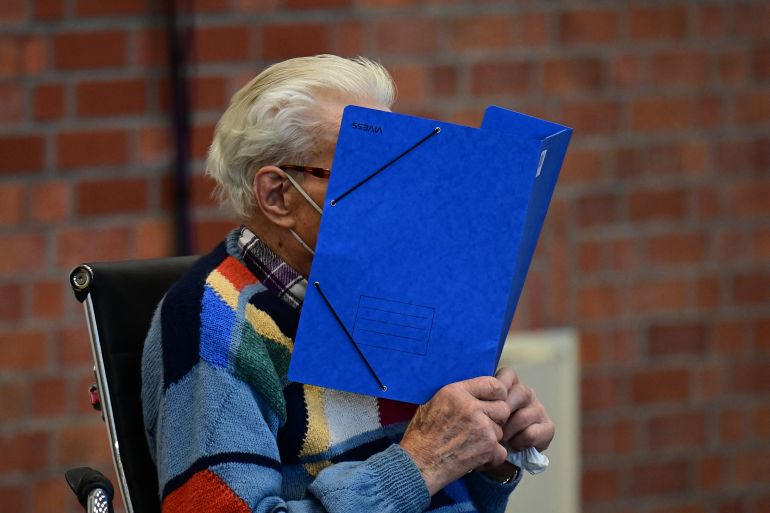Germany sentences 101-year-old Nazi camp guard to 5 years in jail
Josef Schuetz was sentenced to five years in prison for working at a Nazi concentration camp during World War II.

A German court has handed a five-year jail sentence to a 101-year-old former Nazi concentration camp guard, the oldest person so far to go on trial for complicity in war crimes during the Holocaust.
Josef Schuetz was found guilty of being an accessory to murder while working as a prison guard at the Sachsenhausen camp in Oranienburg, north of Berlin, between 1942 and 1945, presiding judge Udo Lechtermann said on Tuesday in the Neuruppin Regional Court.
Keep reading
list of 4 itemsGermany finds hundreds of Nazi-linked staff in security agencies
German Nazi war crimes suspect, 96, faces court
Former Nazi camp secretary, 96, caught hours after fleeing trial
The pensioner, who now lives in Brandenburg state, had pleaded innocent, saying he did “absolutely nothing” and was not aware of the gruesome crimes being carried out at the camp.
“I don’t know why I am here,” he said at the close of his trial on Monday.
But prosecutors said he “knowingly and willingly” participated in the murders of 3,518 prisoners at the camp and called for him to be punished with five years behind bars.
In the trial, which opened in October last year, Schuetz said that he had worked as a farm laborer near Pasewalk in northeastern Germany during the period in question.
However, the court considered it proven that he worked at the camp on the outskirts of Berlin between 1942 and 1945 as an enlisted member of the Nazi Party’s paramilitary wing, the German news agency DPA reported. He was 21 years old at the time.
Despite his conviction, he is highly unlikely to be put behind bars, given his age.
Prosecutors had based their case on documents relating to an SS guard with the man’s name, date and place of birth, as well as other documents.
For organisational reasons, the trial was held in a gymnasium in Brandenburg/Havel, the 101-year-old’s place of residence. The man was only fit to stand trial to a limited extent and was only able to participate in the trial for about two and a half hours each day. The trial was interrupted several times for health reasons and hospital stays.
Schuetz’s lawyer Stefan Waterkamp told the AFP news agency ahead of the verdict that if found guilty, he would appeal.
Sachsenhausen was established in 1936 just north of Berlin as the first new camp after Adolf Hitler gave the SS full control of the Nazi concentration camp system.
It was intended to be a model facility and training camp for the labyrinthine network that the Nazis built across Germany, Austria and occupied territories.
More than 200,000 people were held there between 1936 and 1945. Tens of thousands of inmates died of starvation, disease, forced labor and other causes, as well as through medical experiments and systematic SS extermination operations including shootings, hangings and gassing.
Exact numbers on those killed vary, with upper estimates of about 100,000, though scholars suggest figures of 40,000 to 50,000 are likely more accurate.
As in other camps, Jewish prisoners were singled out at Sachsenhausen for particularly harsh treatment, and most who remained alive by 1942 were sent to the Auschwitz death camp.
Sachsenhausen was liberated in April 1945 by the Soviets, who turned it into a brutal camp of their own.
Tuesday’s verdict relies on recent legal precedent in Germany establishing that anyone who helped a Nazi camp function can be prosecuted for accessory to the murders committed there to bring the last surviving Nazi perpetrators to justice.
In 2011, former guard John Demjanjuk was convicted on the basis that he served as part of Adolf Hitler’s killing machine, set a legal precedent and paved the way to several of these twilight justice cases.
Since then, courts have handed down several guilty verdicts on those grounds rather than for murders or atrocities directly linked to the individual accused.